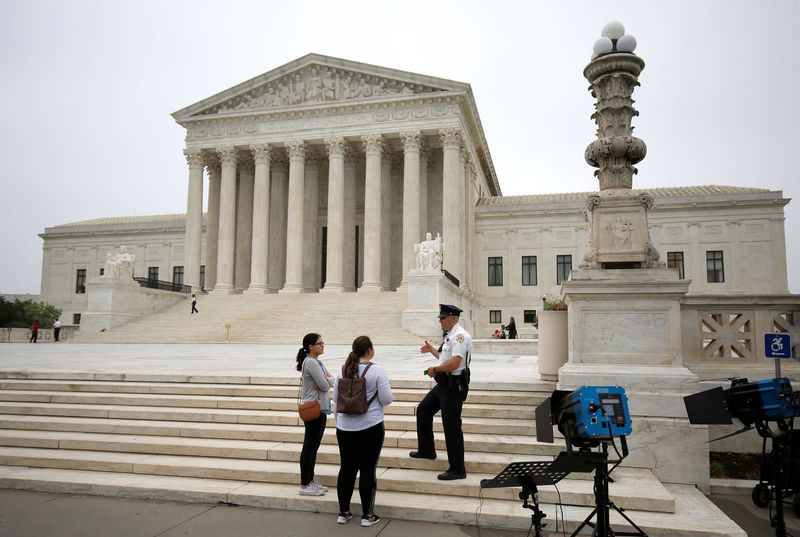 © Reuters. A police officer speaks with tourists before decisions are released at the Supreme Court in Washington
© Reuters. A police officer speaks with tourists before decisions are released at the Supreme Court in WashingtonBy Hilary Russ and Laila Kearney
NEW YORK (Reuters) – A handful of U.S. states are in position to capitalize quickly on New Jersey’s victory at the U.S. Supreme Court allowing it to legalize sports betting, and more than a dozen others could follow suit before long.
Monday’s ruling opened the door for states to grab a slice of an estimated $150 billion U.S. sports betting market, an enticing new revenue stream for state budgets that have been pressured by years of slow economic growth.
Five states – Connecticut, Mississippi, New York, Pennsylvania and West Virginia – already have sports betting laws in place that would allow them to move quickly following the Supreme Court’s decision, according to Fitch Ratings. Fourteen others have introduced sports-gaming legislation in recent legislative sessions.
“This new opportunity for states may result in 2018 being the single largest year for gaming expansion,” S&P Global Ratings said in a report released after the ruling.
The high court’s ruling did not legalize sports gambling nationwide, but instead paved the way for states to pursue it as they wish. The result is likely to be a patchwork of distinct state regulations and programs, and outside of New Jersey, will not happen immediately.
“It’s going to take years. Every state obviously is different. It’s not something that happens overnight,” said Irwin Kishner, who practices sports law in New York.
Rhode Island and other states with non-tribal casinos and facilities for off-track betting for placing racehorse wagers outside of the racetrack were most likely to hit the ground running, said S&P Global Ratings.
For some, it is an opportunity to bolster their casino industries.
In Mississippi, “the biggest plus coming from sports betting is going to be additional foot traffic to the casinos,” including from out-of-state visitors, said Mississippi Gaming Commission Executive Director Allen Godfrey.
The Mississippi commission is in the process of publishing regulations and taking other steps to roll out sports wagering after the state tweaked its gaming code last year to allow it, he said.
“I think we’re going to go very slow and methodically” to produce the best product, Godfrey said. An exact time frame has not been determined.
West Virginia lawmakers approved sports gambling in March despite opposition by Governor Jim Justice, who allowed it to become law without his signature because he objected to the idea of sharing a portion of revenues with professional sports leagues.
NOT ALWAYS A JACKPOT
Some analysts cautioned that expectations for massive windfalls for states were overblown.
Emily Raimes, a Moody’s Investors Service analyst, said in a statement that state and local governments could “see minor benefits from the incremental tax revenues.”
It has not even necessarily been a home run for the one place it has been fully legal: Nevada.
Last year, sports wagering reached nearly $4.9 billion in Nevada but generated only $17 million in state tax revenue, which is just 0.4 percent of the state’s $4 billion in general fund revenue, according to Fitch.
How much any state benefits from the shift will depend on an array of complicated factors.
One big hurdle that could slow implementation is conflict between sports leagues and the casino industry over an “integrity fee” that would give the leagues themselves a portion of the bets taken, said Daniel Wallach, a Florida sports and gambling attorney.
States in which Indian tribes control or heavily influence casino development may also move more slowly, including Connecticut and Florida.
In Connecticut, for instance, two tribes said they would have exclusive rights to run any authorized sports betting operations.
Connecticut Governor Dannel Malloy said after Monday’s ruling that he was prepared to call the legislature into special session to consider how to proceed.
Some state constitutions also require voter referendums to legalize sports wagering. New Jersey voters overwhelmingly approved it back in 2011.
Political opposition is also sure to persist. The Stop Predatory Gambling nonprofit group said New Jersey’s cause was a “naked money grab … cloaked as a ‘states’ rights’ case.”
Source: Investing.com





























